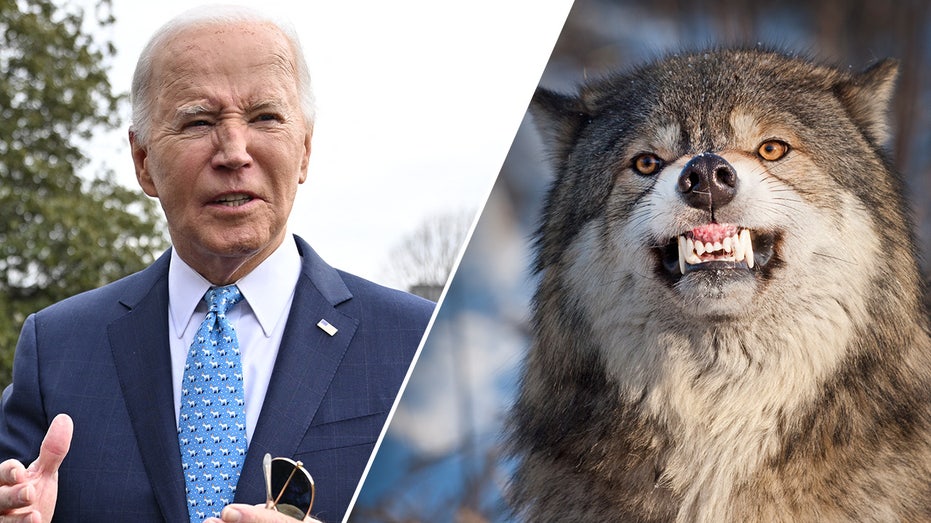Republicans raise alarm as Biden admin prepares plan to protect wolves nationwide
FIRST ON FOX: House Republicans on the Natural Resources Committee are probing the Biden administration over its efforts to protect the gray wolf species.

FIRST ON FOX: House Republicans on the Natural Resources Committee are raising the alarm about a Biden administration initiative they said could lead to expanded protections for the gray wolf species, despite opposition from farmers and western states.
Committee Republicans led by Chair Bruce Westerman, R-Ark., informed Fish and Wildlife Service (FWS) Director Martha Williams that they were probing her agency's National Dialogue Around Working Landscapes and Gray Wolves and Thriving Communities and Cultures, an initiative unveiled in December. The lawmakers said oversight was necessary given the significant effect of listing the gray wolf.
"The facts are clear regarding the listing status of the Gray Wolf in the lower-48 states — the species is recovered, should be delisted, and management should be returned to the states," Westerman and eight fellow Natural Resources Republicans wrote in a letter to Williams on Thursday. "Delisting the gray wolf in the lower-48 states has traditionally garnered bipartisan support."
"Yet under the vague parameters of the Service’s proposal, the Service could begin to dictate to states what their management approaches should be," they added in the letter. "Perhaps more concerning, they could utilize this proposal as a proxy to relist wolves in the Northern Rockies without the support of the impacted States."
On Dec. 13, FWS launched its gray wolf dialogue initiative to "foster the long-term conservation of wolves and address the concerns of varied communities." The agency said the effort would include discussions involving those who live near wolf populations and those who are interested in preserving the species, and contracting a third-party conflict resolution firm to oversee the initiative.
However, while the agency said the initiative would inform its policies and future rulemaking about wolves, it did not offer any additional details about what it specifically hoped to achieve.
LOCAL RESIDENTS EXPLODE AT BIDEN OFFICIALS OVER PLAN TO RELEASE GRIZZLY BEARS NEAR THEIR COMMUNITIES
"The Committee is concerned that the 'National Dialogue Around Working Landscapes and Gray Wolves and Thriving Communities and Cultures' could potentially impact areas where wolves are delisted and currently under state management, like in the Northern Rockies Ecosystem," the Republicans wrote in their letter.
"States in the Northern Rockies Ecosystem have a proven track record of success in managing healthy wolf populations, with current populations being stable and even slightly increasing year to year," they continued.
For years, environmental and conservation nonprofits have advocated, through both public campaigns and litigation, for FWS to maintain federal protections for the gray wolf under the Endangered Species Act (ESA). Once a species is listed under the ESA, individuals and groups are prohibited from removing, interfering with, hunting or harming it.
According to environmentalists, the gray wolf is vital to ensuring ecosystems are healthy by keeping prey populations in check.
However, western states, in addition to agriculture and livestock industry associations, have argued that gray wolves are already recovered and that any recovery plan should be overseen by state officials who are more informed about the wildlife needs within their borders. As such, in 2020, the Trump administration declared the species fully recovered in the U.S. and delisted it from the ESA.
"After more than 45 years as a listed species, the Gray Wolf has exceeded all conservation goals for recovery," former Interior Secretary David Bernhardt said in a statement at the time. "Today’s announcement simply reflects the determination that this species is neither a threatened nor endangered species based on the specific factors Congress has laid out in the law."
In early 2022, though, a federal district court reinstated the ESA protections in the lower 48 states, a decision that does not impact the Northern Rockies ecosystem. The Republicans on Thursday expressed concern that FWS would pursue further protections for the gray wolf, including in that region, as a result of its dialogue initiative.



